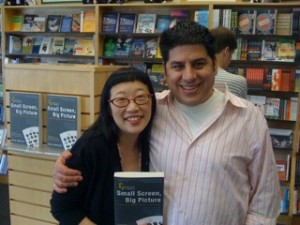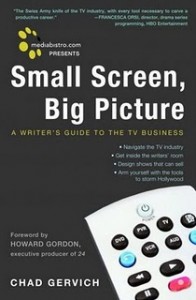TV Tuesday: What is TV Pilot Season?
Welcome to my first TV TUESDAY blog! As many of you know, I have been writing for TV dramas since 2002. My first show was a staff writer on NBC’s THE WEST WING, and I’m currently a Producer on the show EUREKA which airs on SyFy. So every Tuesday, I will post a fun TV TUESDAY blog with links, news, and tips for those of you who are either aspiring TV writers or are TV junkies. ![]() I also know many of you who follow me on Twitter (@paulayoo) are huge sci fi and Eureka fans, so I promise lots of fun Eureka-related blogs as well.
I also know many of you who follow me on Twitter (@paulayoo) are huge sci fi and Eureka fans, so I promise lots of fun Eureka-related blogs as well.
For my first TV TUESDAY, I thought I’d write about the annual “Pilot Season.” I’m sure many of you have heard the latest breaking news of what shows have been scheduled for the upcoming fall season. I thought I’d explain more about how TV shows are scheduled – it’s a complicated, byzantine process.
(Keep reading after the jump to find out more about TV Pilot season!)
TV PILOT SEASON
I’ve written about TV pilot season before. Because I’m starting up this new blog schedule and I work full-time, I’m going to include info from an older blog from my original website that was posted on March 1, 2009.
Back in March 2009, I blogged about attending my good friend CHAD GERVICH‘s writing workshop on TV pilots. A lot of the information provided in that blog is still relevant today. So here’s a recap…
From my blog posted March 1, 2009 at my old website:
I wanted to share with you some notes I took during a lecture given by good friend and TV writer/executive CHAD GERVICH. He gave a lecture on “Seven Steps to Selling Your Show” at The Writers’ Store in Westwood.
Chad Gervich is the author of SMALL SCREEN, BIG PICTURE: A WRITER’S GUIDE TO THE TV BUSINESS from Mediabistro.com Books (2008). I wished he had written this book when I first got my start as a TV writer. This book is my new industry bible. It’s well written, compelling, and truly explains every single detail into how TV shows are put together and how the business works.
Chad and I met at the Warner Bros. TV Drama Writing Workshop back in 2002 and have stayed in touch ever since. He is a wonderful, very warm and engaging person with a hilarious sense of humor. Chad is a television producer, published author, and award-winning playwright who has written, developed, or produced TV series and pilots for nearly ever network and studio in Hollywood. He currently has a development deal with 20th Century Fox Television.
To find out more about Chad, check out his website here: http://chadgervich.com/ You can also check out his archived SCRIPT NOTES here: http://blog.writersdigest.com/scriptnotes/ To order his book, go here: http://www.amazon.com/Mediabistro-com-Presents-Small-Screen-Picture/dp/0307395316/ref=pd_bbs_sr_1?ie=UTF8&s=books&qid=1235967283&sr=8-1
Below are some highlights from a writing lecture he gave at The Writers’ Store in Westwood, CA for aspiring TV writers…
— “The biggest difference between a movie and a TV show: A movie is a finite experience where at the end of two hours, the story is done. A TV show tells a story through episodes that are part of a larger story that goes on for years… or even infinity, like The Simpsons.”
— Elements of a Successful TV Show: Chad then discussed how the TV industry works in terms of seasons…
– Development Season: Lasts from June to October. The networks hear 1,000 pitches from writers for comedy and drama series ideas. They purchase about 120 ideas (comedy and drama) and develop these ideas into scripts with the writer. The first draft is due around Thanksgiving. The production company will give notes to the writer, who then rewrites the script. That revised script is then given to the network, who gives the writer more notes. The writer rewrites the script AGAIN and this time the studio gives their notes. The writer rewrites the script AGAIN. This final draft is then delivered to everyone by Christmas.
– Pilot Season: Lasts from January to May. The executives read and discuss the final revised scripts they received around the holidays. They narrow these 120 scripts down to about 20 to 30 scripts per network (both comedy and drama) that they want to be casted and filmed into actual pilots. The finished filmed pilots are then watched by the network execs in April and May, and by mid May, the networks have decided which pilots will be picked up for the fall season. Out of the 20 to 30 filmed pilots, they usually select about four to eight shows to air per network. Out of those shows, about 3 to 4 actually make it through their first season and are not cancelled. Out of those 3 to 4 successful pilots, maybe ONE show is a hit and will be renewed for a second season.
So you go from 1000 ideas in June to ONE show being successful by the following year. Wow!
– Chad said a TV show needs to have five elements. They are: GENRE, PREMISE, STRUCTURE, CHARACTERS… AND “CHAD’S MYSTERY ELEMENT.”
Genre: Chad says your show should be defined as a procedural (straightforward mystery show with clues that lead the characters to solve the mystery at the end of each episode), a character-driven show where it’s about the relationship between the characters that create stories, soaps (like character shows but have a more serialized element where you must see every single episode in order to understand the storylines), and “event” dramas like “Lost” where there is one major event that defines the series’ main storyline.
Premise: Chad says you should be able to describe the main idea of your series in one sentence. This premise should articulate the story at its simplest level, show where the conflict is coming from within that world, and articulate how the show functions emotionally and thematically. All in one sentence!
Structure: Is your show a stand-alone series where each episode has a solid beginning, middle and end, and you don’t have to watch all the episodes in order to understand what’s going on? Or is your show a serialized series where if you miss one episode, you’re screwed because you need to see every single episode to know what’s going on?
Characters: Is it a Single Lede or Ensemble driven show? How do your character see the world and how do they interact with each other? Chad discussed the characters of Friends, saying that Ross sees the world through the ordered lens of math and science, where everything made sense logically, and the minute something went emotionally wrong, he would “go bonkers.” And then Rachel was impulsive and flighty and she saw the world as hers, she was a spoiled rich girl who always relied on her gut instinct. And these two polar opposites fall in love. These two will never see eye to eye but they will never be torn apart.
Chad’s Mystery Element: Voice. Chad gave a beautiful speech about how voice is how you see the world – and how that perspective is what gives your writing and your show its “voice.” For example, he said Marc Cherry’s “voice” comes from his point of view that “the world is a beautiful place but if you pull back the curtain, all the beautiful people want something and they will do whatever it takes to protect what they want… it’s a dog eat dog world where people will do anything to get ahead and protect their own. But even in this dog eat dog world, our friends are on the one thing we can count on to get through this gorgeous, vicious world. And that is how Marc Cherry created his voice for the show Desperate Housewives.”
— Chad’s Seven Steps to Selling Your Show:
1. Logline (one line description of the show)
2. Synopsis (one paragraph expanding upon the logline)
3. Summary (one page description)
4. Character Descriptions (how they see the world an dhow they relate and interact with each other)
5. Pilot outline (outline the main beats for each act of the script)
6. Sample episodes (be prepared to have a half dozen ideas for future storylines)
7. Emotional intro (come up with your opening “pitch” that is chockfull of emotion)
I highly recommend you check out Chad’s book to find out the details behind these seven steps, but I leave you with his “emotional intro” for the show FRIENDS. He the way that show was pitched was to hit the universal truth behind these six characters … “Friends is about six best friends navigating the waters of life after college. They’re trying to figure out who they are, what their career is versus their job, what they want in love and relationships. At the end of the day, after they’ve had a bad date or gotten rejected or had a really bad day at work where their boss yelled at them, they return home to their best life support system… their friends…”
######
Other links from the 2011 TV Pilot Season that I thought you might find helpful are listed below:
FROM SCRIPT TO SHOW: A New York Magazine article listing all the pilot scripts that were considered for the Fall 2011 TV Lineup. It’s amazing to see all the pilot scripts listed along with their loglines and to see which ones made it through the complicated process! Link here: http://nymag.com/arts/tv/upfronts/2011/pilots-2011-5/
CRAFTY SCREENWRITING: I think Alex Epstein’s website and book on TV writing are very informative and helpful, especially for those of you who dream of writing for TV or are in the beginning stages of the process. Check out Alex’s website here: http://www.craftyscreenwriting.com/
THE FUTON CRITIC: Another great resource for TV industry breaking news. Link here: http://www.thefutoncritic.com/
DEADLINE HOLLYWOOD: A must-have bookmarked site for breaking movie, TV, industry, and celebrity news. Link here: http://www.deadline.com/hollywood/
TV TATTLE: I read this every morning. It’s the best blog that lists all the latest breaking TV news in one user-friendly site. Link here: http://tvtattle.com/
SCRIPT SHARK: This is a great collection of blogs from people working in the TV industry right now. Another site to bookmark immediately. Link here: http://www.scriptshark.com/
######
Well, that’s it for this week’s TV TUESDAY. If you have any TV writing related questions, please post them here and I will answer them in future TV TUESDAY blogs! Until next time… Happy Writing! WRITE LIKE YOU MEAN IT! 🙂


